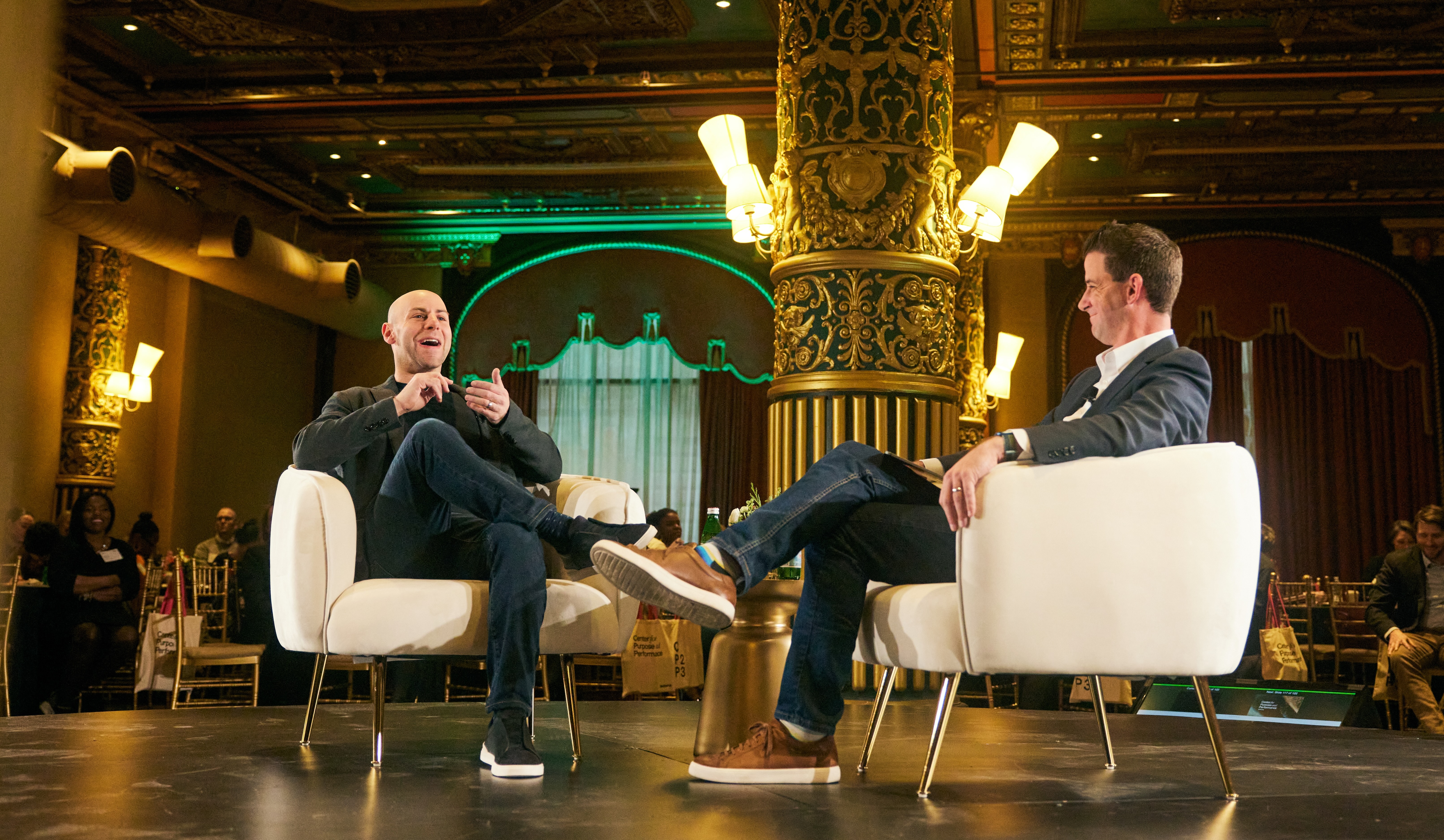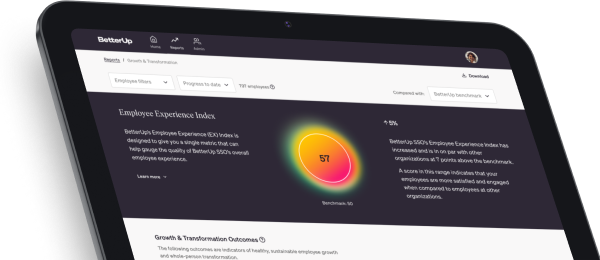-
EN - US
EN - US
-
For Business
For Business
How it works
Platform OverviewTransform your enterprise with the scalable mindsets, skills, & behavior change that drive performance.
IntegrationsExplore how BetterUp connects to your core business systems.
Powered by AIWe pair AI with the latest in human-centered coaching to drive powerful, lasting learning and behavior change.
Products
BetterUp Lead™Build leaders that accelerate team performance and engagement.
BetterUp Manage™Unlock performance potential at scale with AI-powered curated growth journeys.
BetterUp Care®Build resilience, well-being and agility to drive performance across your entire enterprise.
Solutions
Sales PerformanceTransform your business, starting with your sales leaders.
ExecutiveUnlock business impact from the top with executive coaching.
Diversity & InclusionFoster a culture of inclusion and belonging.
GovernmentAccelerate the performance and potential of your agencies and employees.
Customers
Case StudiesSee how innovative organizations use BetterUp to build a thriving workforce.
Why BetterUp?Discover how BetterUp measurably impacts key business outcomes for organizations like yours.
-
For Individuals
For Individuals
What is coaching?
About CoachingLearn how 1:1 coaching works, who its for, and if it's right for you.
Find your CoachAccelerate your personal and professional growth with the expert guidance of a BetterUp Coach.
Types of Coaching
Career CoachingNavigate career transitions, accelerate your professional growth, and achieve your career goals with expert coaching.
Communications CoachingEnhance your communication skills for better personal and professional relationships, with tailored coaching that focuses on your needs.
Life CoachingFind balance, resilience, and well-being in all areas of your life with holistic coaching designed to empower you.
-
Resources
Resources
Library
Courageous leadership developmentResearch, expert insights, and resources to develop courageous leaders within your organization.
Guides & ReportsBest practices, research, and tools to fuel individual and business growth.
EventsView on-demand BetterUp events and learn about upcoming live discussions.
Blog
BetterUp BlogThe latest insights and ideas for building a high-performing workplace.
BetterUp Briefing
BetterUp BriefingThe online magazine that helps you understand tomorrow's workforce trends, today.
Research
BetterUp LabsInnovative research featured in peer-reviewed journals, press, and more.
Center for Purpose & PerformanceFounded in 2022 to deepen the understanding of the intersection of well-being, purpose, and performance
- About
Shaping the future of work with purpose: Insights from Adam Grant and Alexi Robichaux

BetterUp CEO and co-founder Alexi Robichaux sat down with organizational psychologist, author, and BetterUp Science Board Member Adam Grant to discuss the role that purpose plays in building a future-ready workplace.
Here are the top 5 insights from their conversation:
Leaders need to help employees connect their roles to impact
Leaders often try to create purpose through meaningful mission statements, but most people struggle to connect their jobs and daily actions to them. When it comes to purpose, leaders need to help link individual roles to their impact on stakeholders and teammates. A key responsibility for managers is to work with their direct reports to determine how their role connects to broader organizational goals.
“Look at all of the jobs your employees do and ask if each of those jobs didn't exist, who would be worse off? The people that you come up with, their stories, their faces, their names, need to be known and shared in the organization. That's where a lot of purpose comes from.”
Adam Grant
The best managers are future-minded coaches
Frontline managers impact employee performance and well-being to a much greater degree than any other organizational factor. They now need to provide clarity and direction more frequently and adapt to rapidly changing priorities, challenges, and complexities in the workplace.
Two of the most vital behaviors? Listening and asking questions. Managers who practice active and empathetic listening, coupled with asking thoughtful and clarifying questions, empower team members to solve problems and innovate. By embracing the role of a future-minded coach, managers help their team members navigate the uncertainty of today’s workplace.
Employees should be architects of their roles
“People already have a sense of purpose around strengths they want to develop and deploy. But they're often given a job that wasn't customized to them so they don't know where to begin."
Adam Grant
Tailoring roles can significantly impact engagement and organizational success. By aligning roles with strengths and potential, employees develop a more profound sense of ownership and commitment. Instead of accepting a generic job description, they become personally and professionally engaged in a role that fits their strengths, values, and interests.
In doing so, they become active architects of how their work supports the business. Amy Wrzesniewski, Jane Dutton, and Justin Berg developed a job crafting tool to help reimagine your job as a flexible set of building blocks designed to support your values, strengths, and passions. When people see their roles as a reflection of their personal purpose, they perform better. This personalized approach also benefits the organization by leveraging unique talents and perspectives.
The value of character skills is increasing
“Business is the only endeavor we perform without practice.”
Alexi Robichaux
Character skills, often called “soft skills,” are often more predictive of long-term success than cognitive skills. One effective way to cultivate character skills is through coaching. A study involving 1,500 entrepreneurs demonstrated this. Those coached on character skills saw a 30% increase in business profits over two years, which was nearly triple the benefit of traditional business training. Proactivity, discipline, and determination are not just values but skills that can be developed throughout life.
Now, more than ever, these character skills are becoming crucial in the AI era of the modern workplace. As Grant pointed out — "character skills are harder to automate." This transition marks a significant shift in what is valued in the workforce, with a growing focus on skills that technology cannot easily replicate.
Leveraging AI as an accelerant to finding purpose
What do we say to workforces fearful that a technological revolution will displace their jobs? Many people fear that technology will disrupt their sense of purpose.
However, new research suggests that identifying tasks beyond AI's capabilities might enhance employees' sense of meaning and purpose at work. In the state of today's workforce, employees and leaders alike should recognize and lean into the challenges and capabilities that AI can unlock. It's through a braiding of human and artificial intelligence that the intersection of supercharged performance lies. Understanding the human side of AI allows us to pinpoint our unique contributions (like complex problem-solving, emotional intelligence, ethical judgment, and more) while propelling our businesses forward in intelligent and efficient ways. Leaders, and BetterUp Coaches, play a crucial role in helping individuals find their distinctive value in areas where technology cannot replicate human skills. Identifying where you have unique value to add and where you're replaceable is where the strongest sense of purpose emerges.
“Humans quickly start to figure out what robots suck at — and then excel in those tasks.”
Adam Grant
As we navigate the future of work, it's clear that purpose-driven, human-centric approaches are more important than ever. Anchoring our efforts in purpose amidst heightened levels of change and uncertainty not only enhances performance but also ensures that our work remains deeply human.
Transform your life
Make meaningful changes and become the best version of yourself. BetterUp's professional Coaches are here to support your personal growth journey.
Transform your life
Make meaningful changes and become the best version of yourself. BetterUp's professional Coaches are here to support your personal growth journey.




-1.png)

10e9.png?width=800&height=300&name=Frame%201%20(3).png)